
 You must remember us publishing a comparative review on WHMCS and WHMAP billing software. Well, if you do, you might be interested in reading this one, since today we are going to check out a few panels more. The very idea of this review is to compare several different billing scripts that may be helpful while starting your own hosting business. No matter whether you are going to resell hosting or run an independent hosting company, you will definitely need a billing system to manage your customers. Our former review was aimed at highlighting the main advantages of the two most popular scripts – WHM Auto Pilot and WHM Complete Solution – for resellers, since those are commonly used by many hosts and provided to their partners. This review is going to reveal the peculiarities of several more billing panels, which are quite competitive but less popular.
You must remember us publishing a comparative review on WHMCS and WHMAP billing software. Well, if you do, you might be interested in reading this one, since today we are going to check out a few panels more. The very idea of this review is to compare several different billing scripts that may be helpful while starting your own hosting business. No matter whether you are going to resell hosting or run an independent hosting company, you will definitely need a billing system to manage your customers. Our former review was aimed at highlighting the main advantages of the two most popular scripts – WHM Auto Pilot and WHM Complete Solution – for resellers, since those are commonly used by many hosts and provided to their partners. This review is going to reveal the peculiarities of several more billing panels, which are quite competitive but less popular.
While picking three other panels to compare with WHMCS and WHMAP we first of all kept rating, usability and functionality in mind. Thus, we are going to compare WHMAP, WHMCS, Parallels Plesk Billing, AWBS (Advanced Webhosting Billing System) and ClientExec. Before we start providing the details and revealing peculiarities, let us deliver some general information on each script.
![]() WHM AutoPilot (WHMAP) was initially designed for use with cPanel/WHM hosting control panel. Being cPanel hosting oriented, this billing software became very popular since it was easy to comprehend and integrate and supported entire cPanel functionality. Though WHMAP has never been developed to support multiple control panels, currently it can also be integrated into Parallels Plesk Control Panel, which popularity gained a significant increase lately.
WHM AutoPilot (WHMAP) was initially designed for use with cPanel/WHM hosting control panel. Being cPanel hosting oriented, this billing software became very popular since it was easy to comprehend and integrate and supported entire cPanel functionality. Though WHMAP has never been developed to support multiple control panels, currently it can also be integrated into Parallels Plesk Control Panel, which popularity gained a significant increase lately.
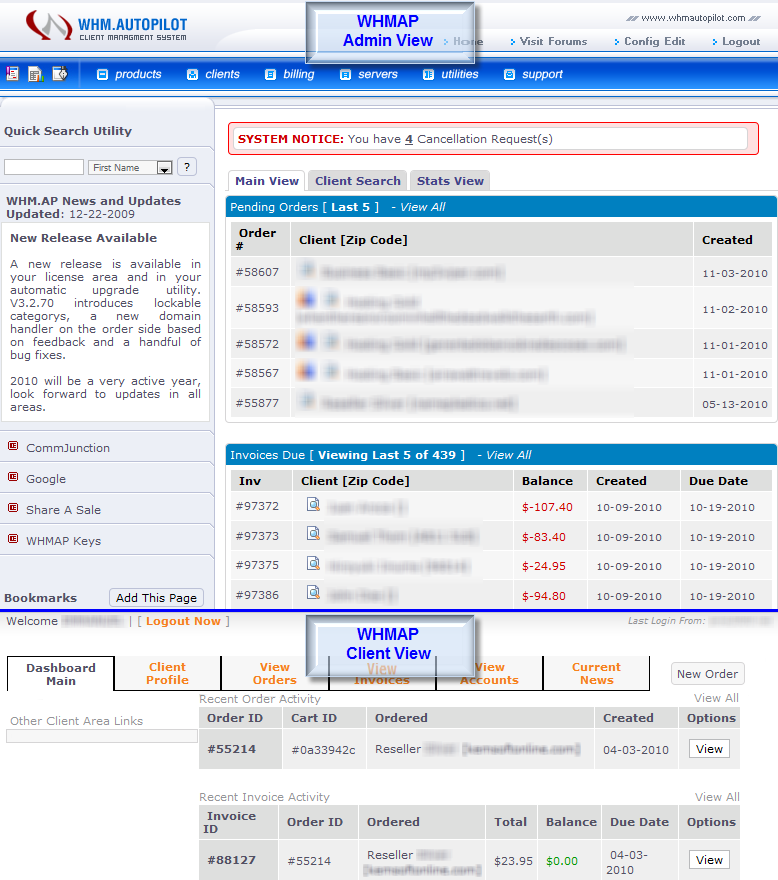
![]() WHM Complete Solution (WHMCS) – unlike WHMAP, this billing software covers a wide range of features, allowing its user to use one system for many purposes. Founded in 2005 (3 years later after WHMAP was introduced) and designed for cPanel/WHM integration, WHMCS project continued developing and by now supports several control panels and domain registrars to handle all hosting related operations.
WHM Complete Solution (WHMCS) – unlike WHMAP, this billing software covers a wide range of features, allowing its user to use one system for many purposes. Founded in 2005 (3 years later after WHMAP was introduced) and designed for cPanel/WHM integration, WHMCS project continued developing and by now supports several control panels and domain registrars to handle all hosting related operations.
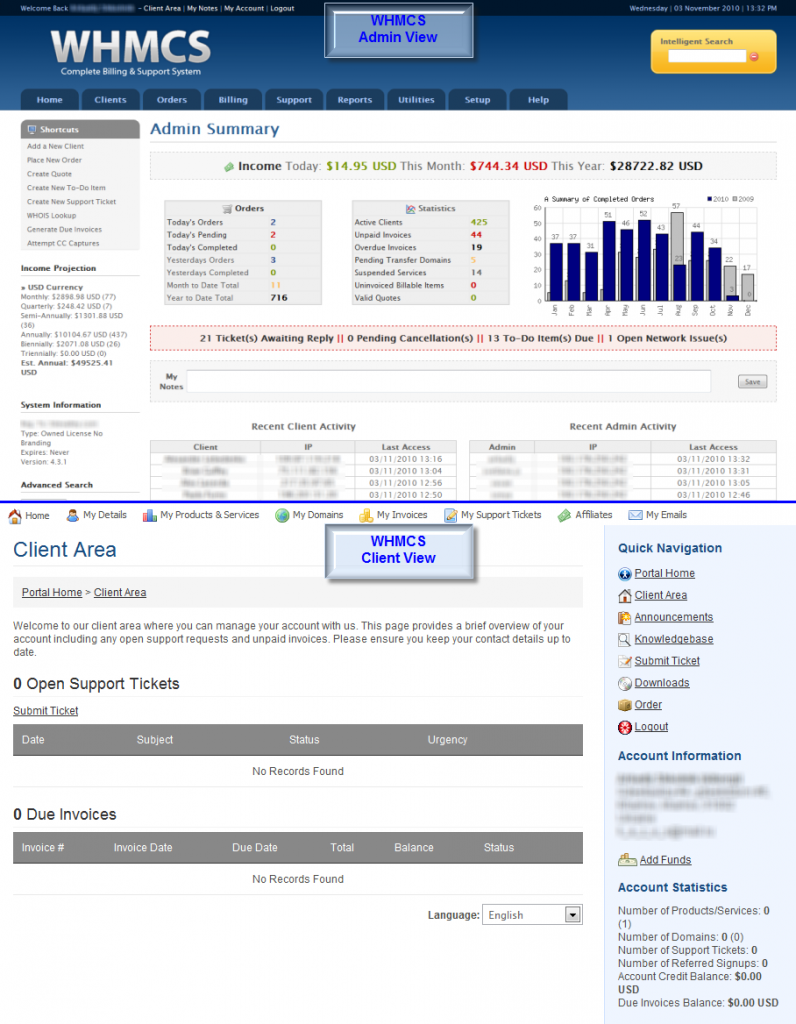
![]() Parallels Plesk Billing is a relatively new product that burst into software market after Parallels, Inc. acquired ModernGigabyte, LLC in January 2008. The initial product was called ModernBill and was rather popular. Rebranding of ModernBill did not just touch the name and the outlook of this billing script – Parallels’ developers got it completely optimized and enriched the functionality of the former ModernBill system.
Parallels Plesk Billing is a relatively new product that burst into software market after Parallels, Inc. acquired ModernGigabyte, LLC in January 2008. The initial product was called ModernBill and was rather popular. Rebranding of ModernBill did not just touch the name and the outlook of this billing script – Parallels’ developers got it completely optimized and enriched the functionality of the former ModernBill system.
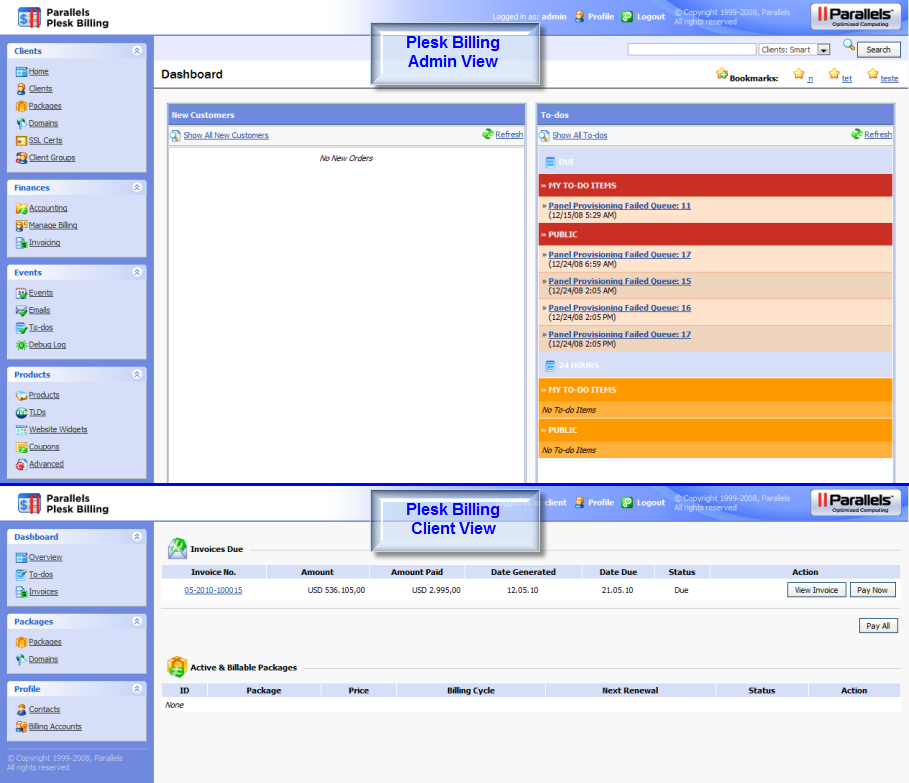
 Advanced Webhosting Billing System (AWBS) has been officially released in April, 2005. Some hosting gurus may remember it under the name of DRAMS, which first release was let out in January, 2004 and became a nice competitive alternative to ModernBill, launched in late 2001.
Advanced Webhosting Billing System (AWBS) has been officially released in April, 2005. Some hosting gurus may remember it under the name of DRAMS, which first release was let out in January, 2004 and became a nice competitive alternative to ModernBill, launched in late 2001.
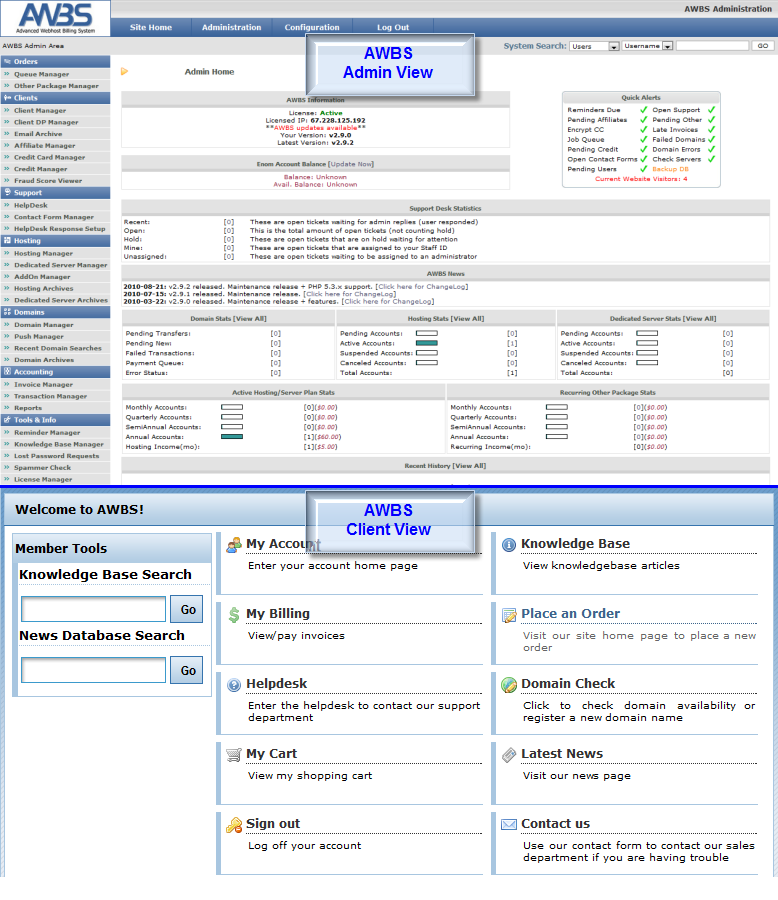
![]() ClientExec is a billing system introduced in 2003. This one was developed with maximum convenience in mind, since ClientExec project began as a hosting company in 1996 and its founders knew for sure, what hosts and their clients want. Currently this software offers one of the most feature rich systems for hosting business management.
ClientExec is a billing system introduced in 2003. This one was developed with maximum convenience in mind, since ClientExec project began as a hosting company in 1996 and its founders knew for sure, what hosts and their clients want. Currently this software offers one of the most feature rich systems for hosting business management.
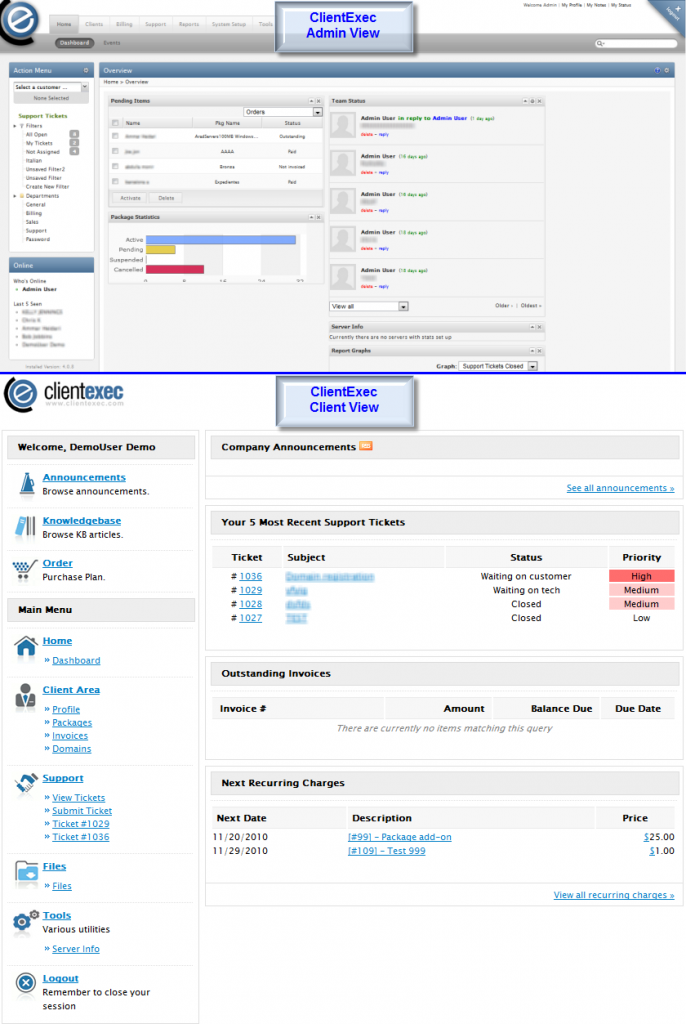
Before we start comparing those five scripts, it is fair enough to mention, that the range of supported features makes each billing system unique and hard to evaluate equally. Additionally, the choice of a billing system depends on the user’s needs and hosting server configuration. Thus, we are going to provide such details as supported options and features, integration options, installation requirements and license details. This review is absolutely independent so the main goal we set is to reveal as many peculiarities of each system as possible to let our readers choose on their own. Well, here we go.
In order not to waste time on listing default “pure billing” features each system has, let us name them upfront. Those are:
When you study features offered by WHMAP, you can see that it is entirely tuned-up for hosting services provision. Apart from the general functionality AutoPilot offers:
Those options show that the client management gets totally simplified for the hosting business owner. Provision of “free” products (not only domains), for instance, has always been a pain in the neck for administrators, since it required a creation of “zero” invoice which implied needless updates – you had to clear a $0.00 invoice each time it is supposed to become due for renewal. WHMAP team got this resolved.
WHMCS developers did really aim at creation of a complete solution, which was supposed to cover not only the billing aspect, but also the entire client management side. Well, they succeeded:
Omitting the first option, all the other ones make WHMCS a rocking out competitor that may draw some AutoPilot users away. Those, who are keen on complete automation and rational information use, may find WHMCS way more convenient for their business. The system does not only allow to send announcements, but also publish them on the website as news. All notifications are tracked, so you can always check what system and ticket messages were sent to your client. Additionally, one of the numerous loadable addons, this script has allows to deliver newsletters – this may come in handy for a socially active user-friendly host.
Parallels Plesk Billing script is something you have to get acquainted with first. It looks like the simplest billing system at first glance and their website does not even say it supports some outstanding features, but when you get a closer look… The first and the most fair remark is that you need to be a Parallels control panel user to feel all the advantages of that billing system. Another remark is about the business, you are going to run – the thing is that Plesk product can be used for ISP billing, too. Therefore, if you are an associate of your local ISP and you wish to use your platforms for web hosting – you can handle all your clients – both the Internet users and website owners using one powerful script.
AWBS feature list may look similar to the one of WHMCS:
However, there are some other features, this billing system may be proud of:
The two latter options are very interesting. Many hosting services used to include different addons to their packages – free domains and SSL certificates have always been the most popular products that come along with the hosting package. Now there is one more “free” product – SEO package. It may include Google Adwords credits or vouchers and is often offered with business hosting.
ClientExec billing system is said to be one of the most rigid WHMCS competitors. Its developers did all their best to make ClientExec look an “even more complete” solution. Apart from the built-in ticket system, it has an optimized intranet solution. Let’s take a closer look at what they offer:
The two last but not least features is what we meant by intranet solution. If your team members are located in different offices or even countries, such online tool with a common database is going to make communication and team management a lot easier. The other features seem to allow ClientExec users carry out billing and customer support tasks in a better way, than any other billing software with integrated helpdesk.
While reviewing the features, offered by those five billing systems, we talked about helpdesk and other modules integration much. The main feature of such software, however, is its own ability to be integrated into a bigger system. Let us see, which hosting control panels, domain registrars and payment gateways those scripts support.
CONTROL PANELS
WHMAP – Made with native cPanel/WHM support in mind, AutoPilot developers made only one extension step – added Plesk hosting panel integration option. Although this software is developer-friendly and WHMAP support team appreciates 3rd party modules, control panels are their weak point.
WHMCS also started as a cPanel-oriented system. By now it supports numerous control panels. Those are:
- cPanel/WHM
- DirectAdmin
- Plesk
- Helm (v.3 and v.4)
- Ensim
- InterWorx
- DotNetPanel
- Lxadmin
- Virtualmin Pro
Additionally, you can get a loadable module for any control panel you wish.
Parallels Plesk Billing has a wider range of supported control panels, since it’s a modular product. Thus, the question of compatibility is resolved via installation of a needed module:
- cPanel/WHM
- DirectAdmin
- Virtuozzo
- Mod-ModernBill
- HSphere
- Ensim (+EnsimUnify)
- Plesk (both for Linux and Windows)
- Plesk Expand
- FreeRadius
- InterWorx
- Cortex
- Hostopia
- eNom (eNomHost and eNom Exchange)
- Helm
AWBS – another modular product – has probably the biggest number of supported panels. Apart from those below, you can have a module for any other control panel, since AWBS comes with a DevKit – a tool for 3rd party modules developers.
- Cast Control
- Centovacast
- Cloudmin
- CPanel/WHM (version 11+)
- DirectAdmin
- DotNetPanel 2.x
- Enom’s Hosting
- Ensim (Linux only)
- Plesk (Windows and Linux)
- Helm Windows (v3.2.3+)
- Hostopia
- HurricaneHost
- Hypervm
- InterWorx (v1.8.1+)
- ISP Manager
- Lxadmin (Kloxo)
- Solus VM
- TCAdmin
- Teamspeak (v2.x and v3.x)
- VDS Manager
- Virtualmin Pro Edition
- WhmPHPNew!
- WHMSonic
- Zervex ServerCP
As far as you can see, AWBS supports not only hosting control panels, but virtual and dedicated server management panels as well.
ClientExec. This billing system also supports many panels and also owing to plug-in integration. So far there are the following plug-ins available:
- cPanel/WHM
- Plesk
- DirectAdmin
- TCAdmin
- HyperVM
- Teamspeak (+Teamspeak 3)
- License Defender
- ISPManager
- InterWorx-CP
- Teamspeak
- WHMSonic
DOMAIN REGISTRARS
WHMAP. Another thing this system is poor in is support of domain registrars. Enom and OpenSRS are the only ones that are supported by default. All the others registrars’ API keys can be submitted for consideration to AutoPilot support. Otherwise, you can create another task for your developer, but regardless of the steps you make – all of them take much time.
WHMCS is the one that simply dominates the niche with 21 registrars supported:
- Enom
- ResellerClub/DirectI
- Nominet
- OpenSRS
- ResellOne
- OnlineNIC
- PlanetDomain
- DistributeIT
- TPPInternet
- RegisterFly
- StarGate
- NameCheap
- NetEarthOne
- 12Register
- Register.com
- IPMirror
- DotDNS
- WebNIC
- InternetBS
- NetRegistry
- Bizcn
Parallels Plesk Billing does not have any registrars modules preinstalled. There is, however, a list of modules available for manual installation:
- Distributeit
- Dotster
- Enom
- Eurodns
- Internetx
- Ispproxy
- Namecheap
- Nominet
- Opensrs
- Registercom
- ResellOne
AWBS also has a nice feature list:
- Dot TK DomainShare
- Enom.com
- Hexonet/Ispapi
- Internet.bs
- IRRP.Net/ispproxy.com
- NetEarth One
- Nokta TK
- Nominet EPP
- Onlinenic
- OpenSRS.net
- Reg.ru
- RegisterFly.com
- Resellerclub (LogicBox systems)
- Resell One
- Generic Module
And again, the DevKit is provided for additional modules creation.
ClientExec may seem to be not that rich in this option, but is definitely supporting a wide range of the most popular registrars:
- Directi Enom
- OpenSRS
- PlanetDomain
- ResellOne
- OnlineNIC
- Realtime Register
PAYMENT GATEWAYS
One of the vital usability aspects for a billing system is gateway support. And that’s where the WHMAP product does not fall behind:
- Authorize.NET
- LinkPoint.com
- USAePay
- BluePay
- CyberSource
- PayLane
- PSiGate
- CDGCommerce
- PayPal
- 2Checkout INS
- Google Checkout
- BluePay
- CyberSource
- eWay
- eGold
- 2Checkout Standard
- StormPay
- NoChex
- CyberSource
WHMCS dominates the niche also with 60 gateways:
- PayPal
- 2Checkout
- Google Checkout
- Quantum Gateway Vault
- Authorize.net
- BluePay
- ProtX/SagePay
- WorldPay FuturePay/Invisible
- Payflow Pro
- Website Payments Pro
- AlertPay
- AsiaPay
- Bank Transfer
- BidPay
- Boleto
- Camtech
- CashU
- CCAvenue
- Chronopay
- E-Gold
- E-path
- eProcessingNetwork
- eWay
- F2B
- Fasthosts
- Finans Bank
- Garanti Bank
- Gate2Shop
- iDeal
- InternetSecure
- IP Pay
- Liberty Reserve
- LinkPoint
- Mail In Payment
- Merchant Partners
- Moneris
- Moneybookers
- Navigate
- Netbilling
- NoChex
- NTPNow
- Offline Credit Card
- OpenECHO
- Optimal Payments
- Pagseguro
- PayJunction
- Paymate AU/NZ
- Payment Express
- Paymex
- Pay Offline
- Payson
- PlanetAuthorize
- SagePay VSPForm
- PSiGate
- SecPay
- SecurePay
- StormPay
- Trust Commerce
- USAePay
- WorldPay
Parallels Plesk Billing offers a not that wide range of gateways, but many of them are alternate:
- LinkPoint
- Velocity Pay
- InternetSecure
- WorldPay
- Quantum
- BluePay
- eWay
- Authorize.net
- Moneris
- PayFlowPro
- PayPal
- PSIGate
- ProTX
- Echo Inc.
- SecurePay US
- SecurePay
AWBS takes the second place with its 35 gateways (and a DevKit for custom modules, of course):
- 2Checkout
- Alert Pay
- Authorizenet (AIM)
- Bluepay
- BRPay (Pagseguro)
- Cajamar
- Cardia
- CCAvenue
- CDGCommerce
- Chronopay
- Echo
- EFT Secure
- E-Gold
- Eprocessing Network
- Eway
- Google Checkout
- Innovative Gateway
- LinkPoint
- Firepay
- Moneybookers
- MultiSafepay
- Netbilling
- NoChex
- Pagamento Digital
- Paypal (Paypal Pro & Paypal IPN)
- Paypal Payflow Pro
- Paysystems
- Planetauthorize
- ProTX (Sagepay)
- PSIGate
- Stormpay
- Webmoney
- Worldpay (+Worldpay Invisible)
- Verus
- Manual CC Processing
ClientExec offers plug-ins for the most popular gateways. Additionally, they provide four offline plug-ins that may be helpful for remote billing operators. The full list can be seen below:
- PayPal & PayPal Pro
- Google Checkout
- Authorize.Net
- BluePay
- CCAvenue
- ChronoPay
- Quantum Gateway
- e-gold
- Internet Secure
- World Pay
- StormPay
- PsiGate
- Protx
- eWay
- Money Bookers
- 2Checkout
- eProcessingNetwork
- LinkPoint
- Check (offline plugin)
- Money Order (offline plugin)
- Bank Transfer (offline plugin)
- Credit Card (offline plugin)
All five panels are actually similar in their system requirements. Their general requirements are OS Linux (some systems can run on Windows-based servers, too), PHP and MySQL database support. More details on each panel can be found below.
WHMAP
WHMCS
Parallels Plesk Billing
AWBS
ClientExec
Now, when we are almost done with all features comparison, it’s high time to reveal the details of licensing and pricing. Each billing system, except for Parallels, offers two types of licenses – Lease and Owned ones – Plesk Billing can be only leased. Apart from this, their licenses differ by accounts limit.
WHMAP is the one that has no limits (except for their “Free Version” with limited support and 10 accounts allowed). The pricing for the others is as follows:
WHMCS are not that generous and apply additional fee for the brandable version of their product:
Parallels Plesk Billing has a stricter licensing strategy – they neither provide unlimited accounts, nor include support into license price:
If purchased along with Plesk control panel with unlimited domains (with initial cost of $70.00/mo), you can get both products for a lower price – $107.99/mo.
AWBS product is offered for a reasonable price; additionally they have a nice discount system:
ClientExec licenses come with different support options. Additionally they have a so-called “Refugee Offer” that gives a 25% discount on any license if the user switches from another billing panel. Their initial prices are:
Summary
If you want to start your own reseller business, you need to have the client management and billing aspect secured. Thus, you are going to need a billing system that allows you to automate as many processes as possible. On the other hand, you will definitely want this solution to be not costly, especially if you are only starting your hosting business. Thus, depending on your needs, server capabilities (vital, if you are a reseller) and budget, you may choose one of the following options:
WHMAP is the simplest and cheapest solution with minimal functionality; maybe the best option for a reseller.
WHMCS – full-featured system for a reasonable price. Not resource intensive and fitting to almost any type of hosting servers to run it. Supports 3rd party loadable modules.
Parallels Plesk Billing – rich in billing features, but reasonable for use only with Parallels Plesk hosting control panel. The only system it takes over is WHMAP… if you don’t check their pricing.
AWBS – a nice WHMCS alternative available at a lower cost. Allows modules customization.
ClientExec – a feature-rich system with outstanding support and project management options. Another cheaper WHMCS alternative.
We hope you find this article useful and it will help you with making your choice. If you have your own opinion to share or would like to rate those panels in the way, you like – feel free to join the discussion at our Facebook.
Did you decide on the billing platform to use but still looking for a hosting service to start your reselling business? Take a look at our cheap Linux VPS and dedicated server offers.





Quick Customer care response, accurate and broad assistance, easy to use client area.....





I am very happy with the service. I am with site valley for many years and at the present usimg 2 hosting packages. Their service is excellent and super fast. Thanks & Greatly Appreciated





I've been hosting my websites with Sitevalley for more than 6 years. Very satisfied with the services and reliability they provide, competitive prices, almost no downtime, fast and knowledgeable customer support.





I have been using side valley for a couple of years now and have to say I am very happy with the service they offer.I use many Hosting services but site valley stands out in front. Reliable service, great support.I don't normally leave reviews but felt I wanted to for this service as it has been fantastic





I didn't want to review so soon on into taking out hosting with site valley but I feel obliged because their customer service is outstanding, second to none, every time I had an issue it was sorted immediately. I would highly recommend Site Valley.





I have been with Sitevalley for over a year and it's the best hosting I have EVER used. And I have been through a lot of them.





The support staff are amazing, and it's clear that they have a passion for hosting websites. I've rather enjoyed this webhosting company and it's stability for the price is bar-none, amazing.





My collegue adviced me to use SiteValley as a reliable hosting provider with great prices, professional and fast Customer Service. My experience with SiteValley was exactly the way I was promised.





I have been with SiteValley for many years, and plan to stay with them for many more. Customer support is very responsive and knowledgeable.
SiteValley.com is rated 4.8 / 5 based on 329 Reviews »

© 2001 – 2026 SiteValley.com. All Rights Reserved.